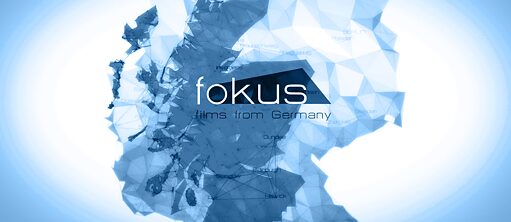FOKUS: Films from Germany 2020
3 - 17 December - ONLINE
This years programme will be released mid November,
Welcome to the 6th edition of FOKUS: Films from Germany
Fokus, films from Germany 2020 is still happening! In keeping with Covid-19 restrictions, and to keep our audiences and performers safe, the annual celebration of German cinema will be an all-digital online affair. The virtual festival will be shorter and smaller than in previous years, and will also move from its usual late November start to December 3-17. But despite the new, one-off format, it will still offer a selection of German movie gems for you to discover. Get ready for your close-up and zoom in for a tighter Fokus.
More information about last years edition:
![]() Download Programme (9,3MB)
Download Programme (9,3MB)
In 2019, we are not only celebrating our own 5-year-anniversary, but two significant historical anniversaries that have shaped German society and culture: The founding of the Bauhaus School in 1919 and the Fall of the German Wall in 1989.
100 years ago, the Bauhaus school opened its doors to students of architecture and design and their ideas went on to have a lasting impact on functional design and city planning all around the world. Our opening night film Bauhaus Spirit – 100 Years of Bauhaus by Niels Bolbrinker and Thomas Tielsch looks back at the philosophy and achievements of the group surrounding Walter Gropius while at the same time providing us with glimpses of future-oriented design projects, whether it be in the favelas of Latin America or a Scandinavian school.
In the summer and autumn of 1989 a chain of events was set in motion that would tear down The Wall, end the Cold War, and unify the two German states. This year’s Fokus selection includes two films that reflect and approach this era of recent German history from very different individual and artistic perspectives.
Andreas Dresen’s Gundermann takes a look at the ambivalent figure of the East German singer-songwriter Gerhard Gundermann. Himself a digger driver in the brown coal fields of Eastern German Lusatia, he was able to capture the feelings of his fellow workers as well as the spirit of (n)ostalgia after reunification as few others did. However, his position of unofficial collaborator of the Stasi, informing on friends and foes alike, complicates the authenticity of his work and his legacy. Ultimately, Dresen’s Gundermann asks about the possibility of redemption in the aftermath of the GDR surveillance culture.
In Adam and Evelyn, director Andreas Goldstein uses the summer of 1989 and the dissolution of the German inner border as a backdrop for his love story between the couple Adam and Evelyn. After an indiscretion by Adam, the couple’s idyllic summer holiday at Lake Balaton turns into a soul-searching journey that finds its end in West Germany. The film title’s biblical allusion haunts the characters – for at least one of them, the start in West Germany might feel like the expulsion from paradise.
While the Fall of the Wall features as a deep transformation of German politics, society and culture, several other films examine the transformative potential of personal encounters and experiences. In Sven Taddicken’s The Most Beautiful Couple, Malte and Liv go through hell together and make it out alive – only to be confronted with their trauma all over again. David Nawrath’s Atlas tells a complicated father-and-son story against a backdrop of the criminal activities of Arabic Clans involved in the illegal real-estate business in German cities. Wolfgang Fischer’s Styx shows us the transformation of a strong woman with a solid moral compass who is torn from her contented world during a sailing trip.
The screening of Richard Oswald’s Different from the Others is honouring another anniversary. Released 100 years ago, the film’s story about Conrad, a homosexual musician who falls in love with his protégé Kurt is considered to be the first pro-gay on-screen romance.
With the award-winning biopic All About Me, Caroline Link dives into the childhood of beloved German entertainer Hans-Peter “Hape” Kerkeling. The Oscar-winning director paints a compelling and deeply empathetic picture of Hape’s upbringing in the Ruhr valley of the 1960s and 70s Germany. While the film pays tribute to Hape’s comedic talent and has the audience howling with laughter, it also deals with issues of mental health, trauma and identity that are deeply entangled with his life.
Our school screenings feature Claus Räfle’s The Resistance (a.k.a. The Invisibles), a partly fictional, partly documentary film about the successful, yet terrifying stories of 4 young Jews who managed to hide and survive in Berlin during World War II and Rüdiger Suchland’s Hitler’s Hollywood, an exploration of German Cinema from 1933-1945. Suchland’s filmic essay tries to understand how the films, produced within the context of Nazi propaganda, affected their audiences. How their myths, stories, open lies and hidden truths were wrapped in the emotional and nostalgic production of a questionable German dream factory.
Our films will screen in cinemas across Scotland, at our venue partners in Edinburgh, Glasgow, Aberdeen, Ayr, St. Andrews and Dundee. Come and join us for one or more of the screenings and discover some of the contemporary and historical ideas and obsessions driving artistic and cultural expression in Germany.
Ann-Christine Simke
(Programme Coordinator, Goethe-Institut Glasgow)
Julia Klingel
(Programme Assistant, Goethe-Institut Glasgow)
Raymah Tariq
(Programme Coordinator, Filmhouse Edinburgh)
-
12.11.
-
21.11.
-
22.11.
-
22.11.
-
22.11.
-
22.11.
-
23.11.
-
23.11.
-
24.11.
-
24.11.
-
24.11.
-
25.11.
-
25.11.
-
26.11.
-
26.11.
-
26.11.
-
27.11.
-
27.11.
-
28.11.
-
29.11.
-
30.11.
-
05.12.
-
05.12.
-
05.12.
-
11.12.
-
04.01.
-
05.01.
-
07.01.
-
08.01.
-
08.01.
-
11.01.
-
15.01.
-
16.01.
-
16.01.
-
20.01.
-
22.01.
-
24.01.
-
27.01.
-
29.01.
-
29.01.

